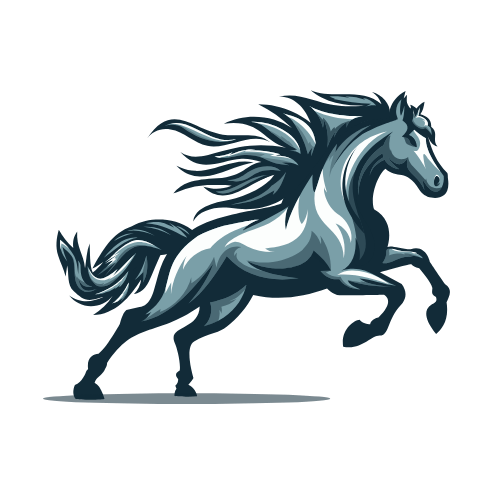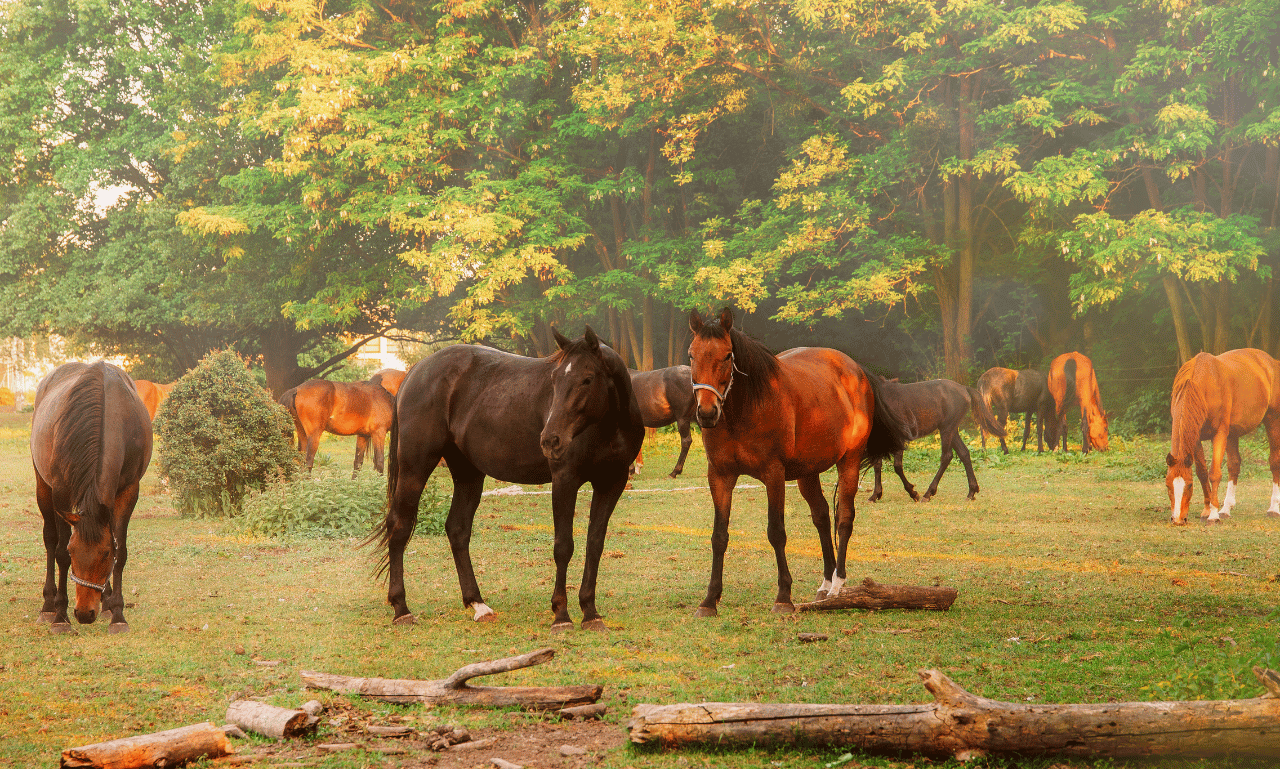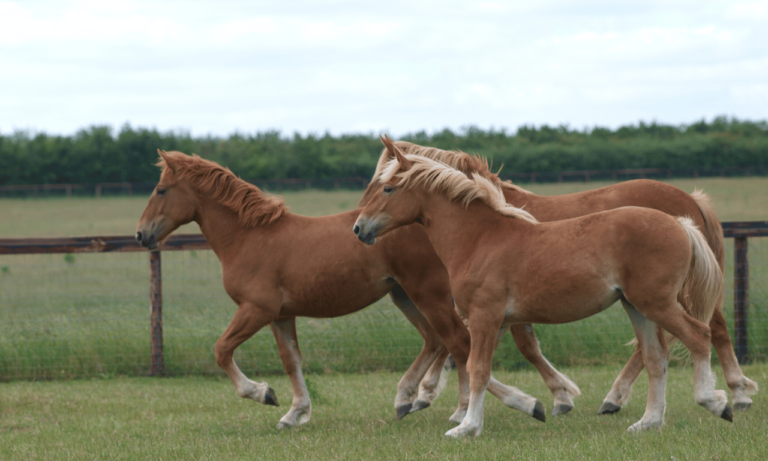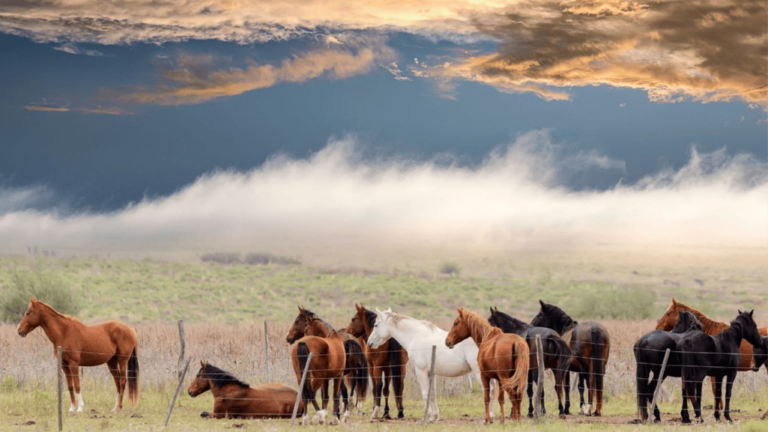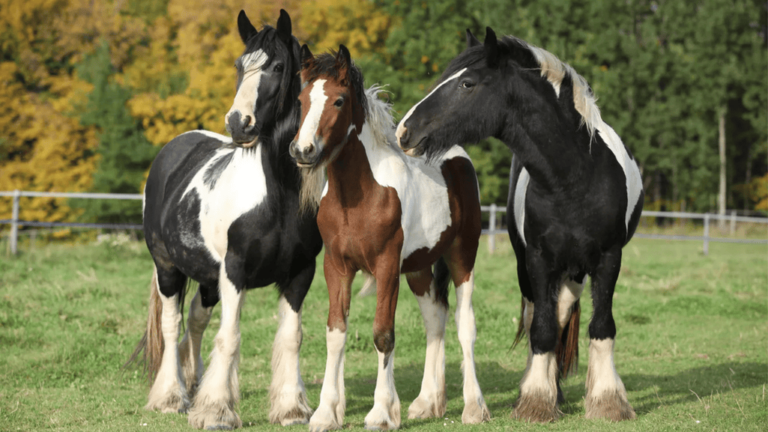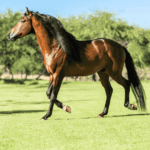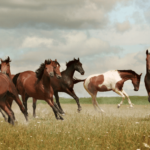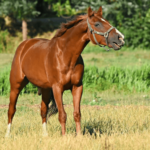The history of America is filled with the sound of horses’ hooves. From the wild Mustangs of the plains to today’s equestrian events, American horses have been key. They’ve helped shape the country’s culture and practical needs.
The American Quarter Horse is a top breed, known for speed and agility. It’s a favorite in Western life and many equestrian activities. These horses show the spirit and growth of America and its people.
Key Takeaways
- The American Quarter Horse is the most loved horse in the U.S., known for its agility and many uses in sports.
- Mustangs, found in the West, are 12–14 hands high. They symbolize the wild heart of America.
- Appaloosas & American Paint Horses, 14.2–16 hands high, are famous for their unique patterns and athletic build.
- Morgan horses have a strong history, over 200 years old, showing America’s lasting heritage.
- The U.S. has over a hundred horse breeds, making it a world leader in horse diversity.
- Horses like the Tennessee Walking Horse and American Saddlebred show the elegance and smoothness of American breeds.
Understanding the Roots of American Equine History
The story of american horse breeds history is as complex as the patterns on the coats of indigenous american horses. It began with the arrival of Spanish conquistadors and their hardy Spanish Mustang. This horse became the foundation of the famous mustang herds of the American West.
Today, the United States is home to over a hundred registered horse breeds. This shows the country’s rich diversity in equine life. The Spanish Mustang is a key part of this history, tracing back to the horses brought by Spanish explorers. It has adapted and survived through the changing American landscape.
The Pryor Mountain mustangs have unique features like a V-shaped face and a sturdy body. Many believe these traits come from their Spanish ancestors. These horses have gathered for centuries near East Pryor Mountain, showing their ability to adapt and survive.
Here is a glance at the significant lineage and characteristics of another historic American breed:
| Breed | Characteristics | Origin Year |
|---|---|---|
| Morgan Horse | Balanced, Athletic, Strong Presence | 1789 |
Morgan horses, like Figure, are known for their balance and athleticism. They were celebrated for their stamina and versatility. This has made them a lasting part of american horse breeds history. Read more about the origins of the horse
Research involving over 80 scientists found that ancient horse DNA in the Western U.S. was mostly Spanish. This supports the idea that horses spread through Native American networks in the early 17th century. It shows how the Spanish Mustang became a part of indigenous american horses.
Learning about american horse breeds history is more than just knowing the past. It’s about seeing how these amazing animals have influenced and been influenced by human history. They continue to ride through time and tradition.
The Versatile and Athletic American Quarter Horse

The American Quarter Horse is known for its amazing versatility and athleticism. It’s a top choice in the United States, especially for ranch work. This breed excels in many equestrian disciplines, both Western and English.
Characteristics and Uses of the American Quarter Horse
The American Quarter Horse is small but very agile. It’s perfect for many tasks. They are 142 to 165 cm tall and weigh 450 to 600 kg. These horses live for 25 to 30 years, showing their strength.
These horses are smart and calm, making them great for different riding styles. They’re perfect for ranch work and rodeos. They can run up to 88 km/h in races over a quarter mile. With 17 recognized coat colors, they add beauty to any pasture.
Impact of the American Quarter Horse on Western Culture
The American Quarter Horse has greatly influenced Western equestrian culture. Since 1940, the American Quarter Horse Association (AQHA) has registered nearly six million Quarter Horses. This breed is key to the American cowboy lifestyle.
They’re not just for work; they’re also stars in Western movies. Their agility and adaptability make them a favorite in America. As a symbol of American equestrian heritage, the American Quarter Horse remains a symbol of strength and agility.
The Noble and Swift Thoroughbred Horse

The thoroughbred horse is a key well-known American horse breed. It combines speed, agility, and grace. Developed from Arabian and English horses, Thoroughbreds are famous in horse racing. They shine at events like the Kentucky Derby.
These horses are not just for racing. They also excel in show jumping, dressage, and eventing. Their endurance and spirit make them versatile in equestrian sports.
Thoroughbreds show the long journey of horse breeds. They’ve gone from war to sports. Their history is a story of careful breeding for speed and endurance.
Thoroughbreds are a big part of American horse culture. They are loved for their racing skills and other equestrian activities. Their fame shows their impact on sports and culture.
| Breed | Average Height | Uses |
|---|---|---|
| Thoroughbred | 15.2 to 17 hands | Racing, Jumping, Dressage |
| Akhal-Teke | 14.2 to 16 hands | Endurance Riding, Racing |
| Clydesdale | 16 to 18 hands | Draft Work, Show |
Thoroughbred horses are at the heart of American horse history. They are known for their nobility and competitive spirit. They are a key part of both history and future equestrian dreams.
The American Paint Horse A Spectrum of Colors

The American Paint Horse is a standout among American horse breeds. It’s known for its bright and unique coat patterns. These patterns are not just beautiful but also define the breed’s identity in the equestrian world.
The Paint Horse has a rich history tied to american horse breeds. It combines the strength of the Quarter Horse and the speed of the Thoroughbred. This mix gives the Paint Horse its muscular build and quick movements. The breed is celebrated for its diverse looks, thanks to three main coat patterns: tobiano, overo, and tovero.
Unique Coat Patterns of the American Paint Horse
The tobiano pattern has big, rounded spots on the horse’s ribs and back. Overo has irregular, sharp markings that don’t cross the back. Instead, they spread across the sides, framing a white back. Tovero combines these, often with dark pigment around the ears and a white face.
The American Paint Horse in Western Disciplines
The American Paint Horse excels in western disciplines like Western pleasure and reining. They are known for their speed, grace, and striking looks. This makes them top contenders in competitions.
These horses are recognized by the American Paint Horse Association. They add color and culture to the American West. In competitions, they show their versatility, proving they’re not just about looks but also performance.
Morgan Horse America’s First Breed

The Morgan horse is one of the oldest American horse breeds. It has a rich history and is loved by many worldwide. This breed is known for its unique american horse breeds characteristics and its impact on other breeds for centuries.
The Morgan horse is special because it excels in many areas. It was used for farming, transportation, and even as cavalry mounts during the Civil War. Its ability to adapt and endure is unmatched.
Learn more about the historical significance of the Morgan. See how it helped in agriculture and the military, especially during the Civil War.
The Morgan horse is also known for its intelligence and toughness. It’s great for sports like dressage and therapeutic riding. Morgans add elegance and power to any competition.
| Statistic | Details |
|---|---|
| Global Population (2005) | Approximately 175,000 |
| Height Standard | 14.1 to 15.2 hands (57 to 62 inches, 145 to 157 cm) |
| Carriers of Rare Genes | Less than 1% affected by Type 1 PSSM; Some carry the silver dapple allele |
| Historical Role | Utilitarian capabilities recognized in 19th century, influenced many modern horse breeds |
| Formal Recognition | The first Morgan Horse Register published in 1894 by Colonel Joseph Battell |
| Registration and Clubs | 90,000 registered with the American Morgan Horse Association; 50 recognized clubs and 20 youth clubs |
The Morgan horse population is growing. It has a strong presence in breed clubs and associations. This shows its lasting appeal and valuable heritage in the American equine world.
Iconic Gaited Grace: The Tennessee Walking Horse
The Tennessee Walking Horse is a standout among smooth gaited American horse breeds. It’s known for its smooth “running walk” and has a rich, yet complex history. This breed was developed over a century ago in Tennessee to provide a comfortable ride over vast lands.
Smooth Rides with the Tennessee Walker’s Unique Gait
The Tennessee Walking Horse is famous for its smooth “running walk” gait. This four-beat movement allows it to move at speeds of 6 to 12 miles per hour. It’s both stylish and functional, making it great for long rides without getting tired.
The breed can also do a “flat-foot walk” and a graceful “canter.” This makes it perfect for riders who want both performance and comfort.
Heritage and Controversy of the Tennessee Walking Horse
The Tennessee Walking Horse has a legacy filled with pride and controversy. It was bred from Narragansett and Canadian Pacers, valued for its role in Southern plantation life. Despite its rich history, the breed has faced ethical challenges, like “soring” to enhance its gait for competitions.
The Horse Protection Act of 1970 was created to stop these harmful practices. Yet, the Tennessee Walking Horse remains a symbol in horse shows. It competes for the title of “The Grand Champion Walking Horse of the World” at the annual event in Shelbyville, Tennessee.
| Characteristic | Description |
|---|---|
| Origin | Developed over 100 years ago in Middle Basin, Tennessee. |
| Main Gaits | Running walk, flat-foot walk, canter. |
| Popular Uses | Riding, driving, light farm work. |
| Association | Tennessee Walking Horse Breeders’ & Exhibitors’ Association located in Lewisburg, TN. |
| Significant Event | The Tennessee Walking Horse National Celebration annually in Shelbyville, TN. |
| Controversy | Associated with unethical training practices like “soring.” |
The Tennessee Walking Horse represents the complex balance between preserving heritage and promoting animal welfare. As a symbol of smooth gaited American horse breeds, its story continues to grow. It is guided by tradition and modern standards of equine care.
Appaloosa Horse: A Native American Treasure
The Appaloosa horse is a symbol of native American horse breeds. It’s known for its unique, spotted coat and deep history. The Nez Perce tribe bred them, showing off beauty and versatility in many equestrian areas.
Appaloosas are eye-catching with their many coat patterns and colors. They come in 13 base coat shades like brown, black, and gray. Each has six unique spot patterns, making them truly special.
Appaloosas have made a splash in movies, starring with Marlon Brando and John Wayne. They’re also stars in competitions. For example, Pay N Go, a famous Appaloosa, showed off at Grand Prix dressage, watched by Paul McCartney.
| Feature | Details |
|---|---|
| Base Coat Shades | Brown, Black, Roan, Buckskin, Gray |
| Spot Configurations | Six Types, Ranging in Complexity |
| Historical Achievements | Bold Adventure won Kentucky Derby 1936 |
| Breed Recognition | Designated as Idaho’s state horse in 1975 |
| Global Registration | Over 700,000 horses registered in the ApHC as of 2013 |
The Appaloosa is a treasure among native American horse breeds. It’s great in Western disciplines and also in hunter/jumper and endurance events. Its legacy in the equestrian world shows the lasting impact of Native American horsemanship.
The Elegance of the American Saddlebred
The American Saddlebred is known for its grace and poise. These horses have a long history and are loved in show rings across the country. They stand out because they can perform many gaits.
A Show Ring Favorite: The American Saddlebred’s Presence
Known for their high-stepping gait and lively faces, American Saddlebreds are a hit in the show ring. They show off their beauty and agility, proving their training and bond with their handlers. This makes them popular in national and international competitions.
Historical Significance of the American Saddlebred
The American Saddlebred’s history goes back to the 1700s, coming from Thoroughbred and Narragansett Pacer lines. They became famous during the Civil War, being the horses of choice for generals. Their strength and bravery played a big role in history, making them key in American equestrian history.
| Attribute | Description | Importance in Showing |
|---|---|---|
| Height | 15.1 to 16.3 hands | Impressive stature adds to aesthetic appeal in the ring |
| Color Varieties | Includes black, bay, grey, chestnut, palomino, pinto | Visual diversity attracts judges and audiences alike |
| Gaits | Five-gaited, including the slow gait and the rack | Displays advanced training and versatility |
| Carriage | Upright with an arched neck and high-stepping action | Exemplifies the classic show horse physique |
The American Saddlebred is a symbol of elegance, versatility, and spirited performance. They are a timeless symbol of American equestrian excellence, whether in history or prestigious horse shows.
Popular American Horse Breeds: Spotlight on Diversity
An american horse breeds comparison shows a rich tapestry. It highlights the unique diversity of American equine culture. Breeds like the American Quarter Horse, Thoroughbred, and Paint Horse each have their own story and traits. They reflect the vast heritage and versatility of horses in the United States.
Exploring the Variety Within Breeds
The american horse breeds list is long and diverse. It captures the imagination and passion of equine lovers across the nation. Breeds are developed for different purposes—racing, work, show, and recreational riding. Each has unique traits for specific activities.
Consider the American Cream Draft, known for its strength and calmness. It’s perfect for farm work and heavy pulling. On the other hand, the American Saddlebred is agile and graceful. It’s great for show jumping and dressage. This variety shows the physical and functional diversity of American breeds.
Responsibility and Care in Horse Breeding Practices
As the popularity of certain breeds grows, so does the need for ethical breeding. Breeders must prioritize the health and well-being of their animals. Ethical breeding means focusing on genetic health and the care of the horses.
Studies and data collection on breeds help understand their needs. This guides better care and breeding practices. For example, conservation efforts focus on maintaining genetic diversity and avoiding health problems from inbreeding.
| Breed | Status | Unique Traits |
|---|---|---|
| American Cream Draft | At Risk | Gentle giants, suitable for heavy farm tasks |
| American Saddlebred | Not at Risk | High stepping gait, excels in show jumping |
| Rottaler | Extremely Rare | Warmblood, known for versatility and endurance |
This comparison underlines the need for preservation efforts. It shows the diversity of these beautiful creatures. They are not just different in appearance but also in their roles in human society.
Conclusion
Looking at horse breeds in America shows us their amazing variety and cultural value. The American Quarter Horse is known for its Western skills and beauty. The Arabian is famous for its quick movements and elegance.
These breeds make horse riding special and show off America’s heritage. They are key to the horse world and our culture.
Horses like the American Paint Horse and Morgan Horse stand out because of their unique looks and smart nature. They are loved by many around the world. They do well in different activities, like racing and Western riding.
Thoroughbreds are fast on the track, Paint Horses shine in Western events, and Tennessee Walking Horses offer smooth rides. Their special traits make them stand out.
At the heart of America’s horse culture are breeds like these. They show our history and values. These horses are more than pets; they are part of our families and history.
By caring for these horses, we keep their stories alive. They will always be a big part of America’s love for horses.
